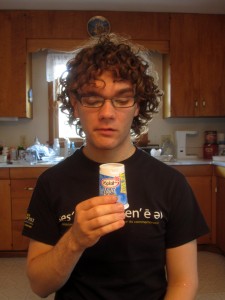At the beginning of our program, we were asked to write down goals for the semester abroad. I wrote “je voudrais m’installer en France pour que la France puisse s’installer en moi.” This basically means “I want to install myself in France so that France may install itself in me.” Feel free to laugh now (especially Alisa Rosenthal); that’s exactly what I did when I reread this later. And yet, as eye-rollingly, face-palmingly cheesy as this goal was, it happened more than I could have predicted.
Not only did I become attached to people, places, and manners of the French lifestyle, but the lifestyle and thoughts and language became attached to me. The first initial proof that I had gotten used to France came with the first food I purchased in the United States. I was in the Chicago airport, having missed my 4:50 flight to Minneapolis. I was getting hungry, and I had to wait until the next flight at 9:45. So, I bought a yogurt parfait at Starbucks. This was an act of the shockingly stupid variety.
In France, I enjoyed real, natural, thick and flavorful yogurt, and I had been warned that my taste in yogurt would be changed. In the U.S., we kill our yogurt, and flavor it with syrup. I took a bite of my yogurt in the Chicago airport, and a startled frown crossed my face. It really did taste like thick, white, sugar-flavored water.
I also became accustomed to the way food was eaten in France. But I wasn’t just used to eating in France enough that it felt natural. I had become so used to it that coming back felt a little unnatural. For my first real meal at home, people didn’t wait for everyone to have their food. We just dug in one by one as we were ready. Red lights exploded in my head warning of increasing levels of impoliteness, and I started to feel uncomfortable. But in the United States at a regular meal, there’s nothing wrong with eating when you’re ready.
It’s not just the meals that feel different. I have also absorbed French into my brain’s language-processing areas, leading to some occasional halting and looking for words. I don’t think anyone notices, but it feels clunkier than it once did to drive my brain in English.
When I went over to my friend Ben’s house to see his family for a while, my brain stopped for a split second, analyzing whether I should address his parents with the formal Vous or the informal Tu form of you. In French, this distinction is an important indicator of respect, hierarchy, and age differences. And it’s not always completely clear what you should call someone, so when you’re speaking French, you start to reflexively ask yourself which to use before you address someone.
As this process kicked into gear in my mind, I’m sure no one noticed the split second furrow of my eyebrows. But when I realized I was going to address them in English, my French inclinations felt oddly compressed: I was squeezing everything that both Vous and Tu mean into a single word. Once I had cleared this all up, I was still shocked that my brain had tried to analyze how to address Ben’s parents like this. Their family has been something like an extension of my own since around 4th grade. And yet, four months speaking French was enough to create new patterns in the way my mind analyzes relationships. It was enough to reflexively wonder whether to address people formally or informally.
Later during the visit, I asked Ben’s mother if it would “derange” her if I looked something up on her ipod touch. What I wanted to say was “would that bother you?” or “is that ok?” but the first word that came to mind was derange, because in French the word is more commonly used for casual questions like that.
Coming home is weird. That is how I have been describing it to everyone so far because it is purposefully vague. I don’t yet understand all of the ideas and habits my brain has absorbed, or what will shock me about my own country. So, when I’m speaking to you, and I stop to ask “can you say that in English?” I’m not trying to be pretentious and pretend that I speak French better than English. Nor am I trying to sneakily redirect the conversation to talk about me and France. There are honestly some things about my own language and culture that I have forgotten just as quickly as I have improved my understanding of the French language and culture.

Eric, what an amazing re-entry narrative you had put together! If you can fit it in your course schedule, please consider taking the Re-entry class here on campus (mondays, 2:30 – 4pm, taught by Patty English and me as a helper!)
Welcome back…. I won’t say welcome ‘home’ as your sense of home may have changed???
Thanks Jill! And you can say welcome home! I didn’t lose any homes over there, just gained one. (And I’ll think about it, but I’ve got a pretty busy year planned already.)